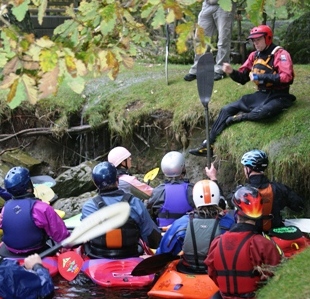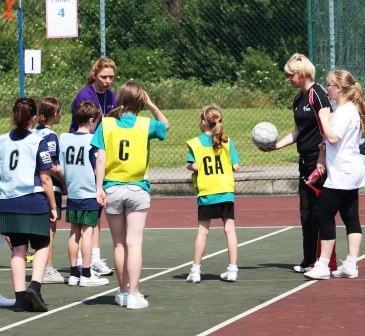Hamish Telfer: challenging coaching practice
Digesting Telfer: the nation’s response
One of the avowed intents of The Leisure Review is to provide a crucible for debate and with the publication of the Hamish Telfer interview in the December issue we achieved our aim. Our coaching editor waded through the electronic mailbags to see what the coaching community had to say in response.
Hamish Telfer: challenging coaching practice
Hamish Telfer’s comments on safeguarding, coaching and coach education provided such a challenge to The Leisure Review’s readers that people found themselves, to quote a coach education officer from one of our leading governing bodies, “veering between agreeing wholeheartedly and disagreeing passionately – sometimes in the same sentence!” Unfortunately, the gist of too many emails was that although the writer was engaged by the debate, exasperated by Telfer’s point of view or fully behind every word , the iron grip of the modern day ‘communications team’ meant that they were unable to comment for publication. But not all of them.
One of the most carefully argued came from Ken Langford who by his own admission is “slightly older” than Telfer and has been coaching within canoeing for 46 years. Given that his first appointment was as coach to the national slalom team in which he was also a paddler, it is fair to say he has worked at the sharp end and has a perspective worth considering. His first point on the Telfer article is unequivocal: “He is 100% right.” Having come across the same things as Telfer in both coaching and coach education contexts, he admits to having felt “like a lone voice in the wilderness at times” and clearly welcomed Telfer breaking cover.
Langford’s coaching journey began in 1966, when “skill was definitely undervalued” and there was “an underlying belief that ‘sitting next to Nellie’ was the best way to learn.” He identifies a lack of credibility in coaching circles “for anyone who had not ‘been there, done it, and got the T-shirt’ and notes as a consequence: “This stopped many going into coaching.” For Langford, albeit a proven performer, developing his coaching skills was a challenge: “As an international slalom canoeist from 1963 to 1975 (and combining this with the role of the national team coach from 1966 until 1981 when a full-time paid coach was appointed for the first time) I have had to seek coaching knowledge for myself because many of my contemporaries seemed to regard canoeing as a past-time or novelty activity.”
The consequences of this ambivalence to coach education was that “two groups of coaches seemed to develop”. He develops the argument: “First there were those with the paper qualifications but no experience who were often denied the opportunity to work with ‘aspiring performers’. More likely they lacked the credibility necessary for the performer to want to work with them.” He then describes the second group, the ones with no qualifications. This group was made up of retired, high-standard performers, and the parents and family of existing performers. These, he says, “wanted to help performers to improve but the qualifications available did not seem to have much to do with improving performance”. So they made their own decisions and their own mistakes.
Langford stopped competing but continued as a coach with the national team until after the Atlanta Olympic Games and notes that even then, in 1996, thirteen years after the establishment of the National Coaching Foundation, “the majority of coaches were not qualified. They had other qualities – organisational or IT skills, motivational ability, communication skills – but seldom did anyone have a full basket of ‘coaching skills’.” With no recognised way of judging a coach’s competence it fell to the performer to make a choice and, according to Langford, “paddlers knew what they needed and who to ask – and who to avoid!”
Clearly this is no longer the case and the canoeing governing bodies have worked long and hard to develop coach education programmes but Langford, like Telfer, is a Sportscoach UK (SCUK) coach educator and identifies an unbidden consequence of that development: “And then we discovered health and safety and child protection.” He explained his complaint with a piece of damning anecdotal evidence: “I once asked a group of kids to list as many rules as they could name about their own club. 80% of those rules began with ‘Don’t’!”
However, again like Telfer, he is keen to give credit where credit is due and says “the NSPCC have been brilliant in promoting their cause and have achieved so much. But, and I have raised this many times, stopping things from happening and prevention of all the nasties does not in itself promote development.” So having praised the Child Protection in Sport Unit of the NSPCC who does he think is remiss? “That is the role of SCUK.”
Jan Turley, who started her own consultancy, Sportsforce, in 2002 and has been involved in the development of the UKCC, delivering CPD for teachers and school sport partnership work, believes that coaches are actually being asked to do two diametrically opposed things. “Coaches suffer the paradox of being encouraged by our current philosophy of adopting child-friendly and child-appropriate approaches to coaching, including the principles of LTAD [long-term athlete development], with the immediate pressures from peers, parents and observers to achieve results. When was a coach whose team ended up in a lowly position in the league ever awarded ‘coach of the year’, no matter how well they delivered the ideals of the UKCC? I think that this is one of the largest barriers to true coach development and ultimately in retaining young people in sport , and it would take a massive change in public attitude in sport to overcome this.” And she echoes Telfer’s concern that positive coach education messages are lost in the ‘real world’ of club coaching: “The 12-hour input on the ‘how to’ of coaching is immediately diluted once the coaches return to their own club environment, particularly if their head coach or role model espouses ‘traditional’ coaching styles.”
Both Turley and Langford are coach educators for their respective governing bodies and for SCUK. They encounter many developing coaches. Langford in particular shares Telfer’s perspective. “For the past twenty years I have been delivering coaching courses for SCUK. What is noticeable is exactly what Hamish says; most of those on the courses are after a piece of paper for ClubMark. This is reflected in the demand for three specific courses [on safeguarding, equity and disability] and for courses aimed at ‘increasing participation' or helping people to have enjoyment or fun. There appears to be a low demand for courses aimed at improving performance once we have passed the ‘come and try it’ or novelty phase.” Turley too is unconvinced by the ClubMark approach: “The ClubMark scheme is simply a set of hoops to jump through for clubs. In no way does it guarantee that a club is offering appropriate standards of delivery. It is merely a quantitative measure of paperwork.”
Ken Langford was elected as spokesman only by his own erudition and emotive reaction to the Telfer interview but he represents a significant percentage of British coaches; the ones who are disaffected, disabused or perhaps just disappointed with the way the drive towards a world-class coaching system seems to have knocked a great deal of the joy out of coaching. It has always been the case that the prism of experience filters out the colour ‘rose’ but just because elder statesmen, and indeed women, can occasionally forget to buy into the Pollyanna approach espoused by the national agencies in the sports system does not make it acceptable that coaches such as Jan Turley should feel “weary of small-time politics and small-minded people” and be thinking of resigning, retiring or redesigning the garden.
Langford ends his correspondence with two trenchant, heartfelt comments. The first is, “Surely it is time for a re-think.” And as he then adds the words on many a correspondent’s lips – “Well said, Hamish” – the final word should go to Dr Telfer, who has commented sporadically on the comments as they arrived. “Put bluntly,” he writes, “some of us who are longer in the tooth are getting a bit fed up with the ‘new kids on the block’ reinventing the same wheel. Sport is suffering from the same malaise as politics. Every time someone new comes along they feel they need to make their mark by inventing something they can call their own in order to make it look like they are doing something. The result is that every few years (or is it months?) we get yet another ‘Baldrick cunning plan’ dressed up as policy.” With a new chair in the chair at SCUK, a new chief executive being recruited and a new minister for whichever department the Tories shoehorn sport into on the horizon isn’t it time somebody listened to the people who know?
The Leisure Review, February 2010
© Copyright of all material on this site is retained by The Leisure Review or the individual contributors where stated. Contact The Leisure Review for details.
Download a pdf version of this article for printing

Taking coaching to the bank

Beyond the 'how to' of coaching